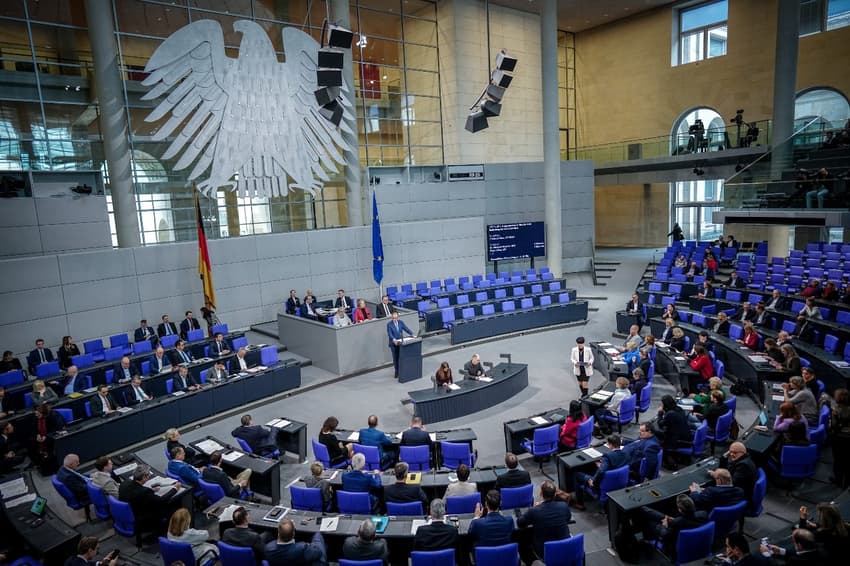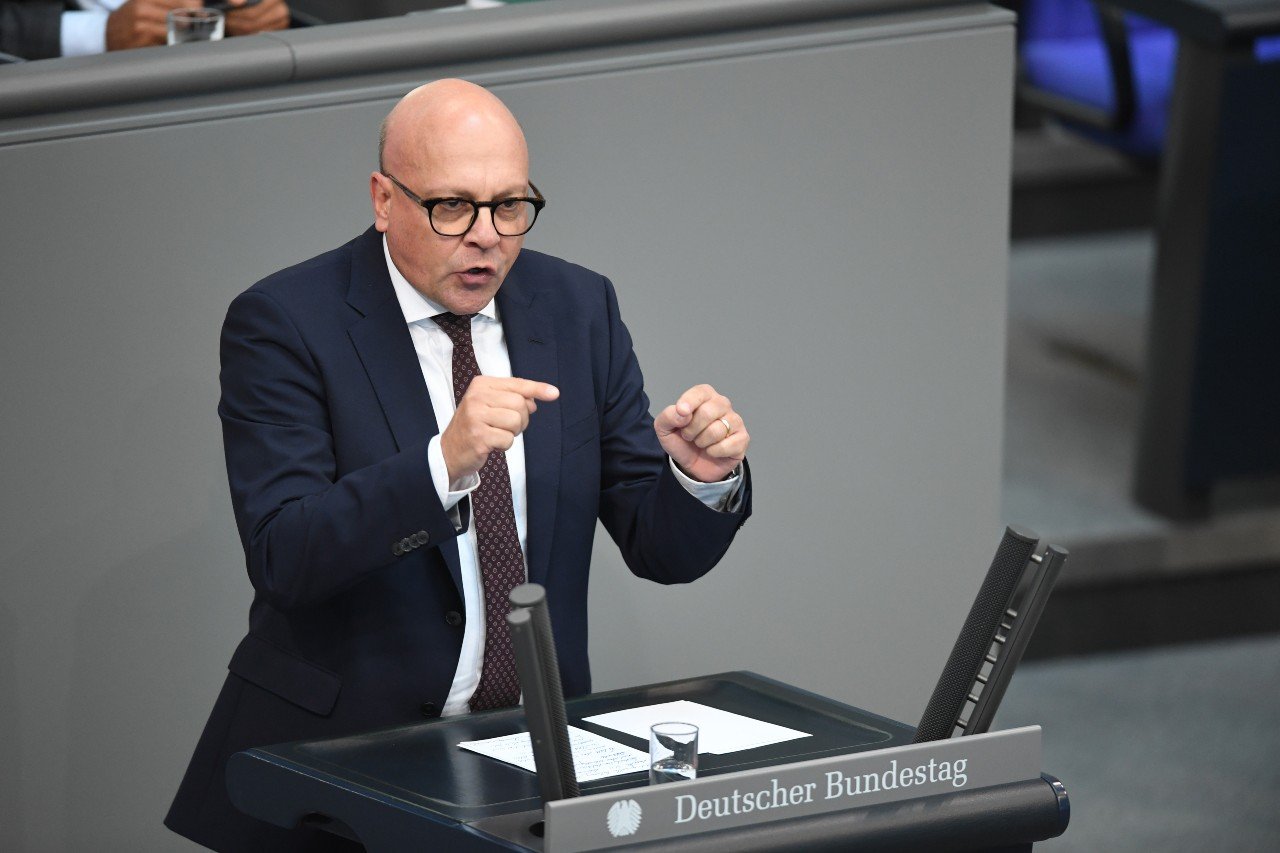German parliament passes landmark dual citizenship reform

German MPs voted through a sweeping reform of the country's citizenship laws on Friday, paving the way for dual nationality and shorter residence requirements for naturalisation.
After a nail-biting two-year wait for foreigners in Germany, the government has passed its flagship bill to relax its citizenship and naturalisation laws.
In the second and third reading of the bill in the Bundestag on Friday, a majority of MPs voted to permit the holding of multiple nationalities in Germany, as well as reducing residence requirements and removing language barriers for over-67s.
All of the parties within Chancellor Olaf Scholz's three-party coalition - the Social Democrats (SPD), Greens and Free Democrats (FDP) - voted in favour of the law, with MPs from the opposition Christian Democrats (CDU), Christian Social Union (CSU) and the far-right Alternative for Germany (AfD) voting against.
Out of a total of 639 votes, 382 MPs voted for the bill, 243 MPs voted against and 23 MPs abstained.
During a hot-tempered debate ahead of the roll-call vote, CDU parliamentarian Alexander Throm - a vocal opponent of the dual nationality law - described the move to liberalise citizenship as “the law with the most wide-reaching negative consequences for our country”.
READ ALSO: KEY POINTS - What you need to know about Germany's citizenship law reform
Repeating a phrase that the opposition conservatives have used several times before, he slammed the bill as a "citizenship devaluation law" and accused the government of trying to generate a new electorate by allowing foreigners to vote.
His ire was particularly directed at members of the Turkish community in Germany, many of whom he said were supporters of the authoritarian president Recep Erdogan.

CDU politician Alexander Throm gives an impassioned speech in the Bundestag during Friday's debate on the new citizenship law. Photo: picture alliance/dpa | Marco Rauch
People who have lived here for decades and decided not to naturalise due to the ban on dual nationality had already chosen their old country over Germany, Throm said.
Picking up on Throm's comments later in the debate, SPD politician Dirk Weise said the CDU only had a problem with dual nationality because they "don't trust the Turkish community in Germany".
"Why don't you raise your voice against a French dual citizen who votes for Marine Le Pen?", he shot at Throm across the debating chamber.
"What about an American citizen who votes for Donald Trump?"
Wiese also pointed out the symmetry in the fact that on January 13th, 1999, the CDU state premier of Hesse - Roland Koch - had launched a campaign against dual nationality.
Now, 25 years later, Interior Minister Nancy Faeser - an SPD minister from Hesse - was pushing through her reform. "Finally, 25 years later, we've manged to do what should have been done a long time ago," he said.
Reem Alabali-Radovan, the government's commissioner for Migration, Refugees and Integration, also spoke in the debate, referencing a recent scandal in which members of the far-right Alternative for Germany (AfD) were found to have attending a secret conference in Brandenburg alongside right-wing extremists.
READ ALSO: Germany's far-right AfD denies plan to expel 'non-assimilated foreigners'
"Last week, at the very latest, it should have been abundantly clear to everyone that there are forces, also in this parliament, who want to get rid of this Germany, who want to sort people according to a racist ideology," she said.

Reem Alabali-Radovan, the government's commissioner for Migration, Refugees and Integration, speaks in the Bundestag citizenship debate on Friday. Photo: picture alliance/dpa | Bernd von Jutrczenka
"Everything has to be decisively defended," she said, describing the citizenship reforms as a "commitment to diversity and openness".
Prior to the vote, the CDU and CSU had presented numerous amendments to the bill, all of which were defeated in the Bundestag on Friday.
The suggestions included proposals to include a declaration acknowledging Israel's right to exist as part of the naturalisation process, as well as plans to deny citizenship to anyone who had not been fully employed for at least two years prior to naturalisation.
'A clear signal'
Welcoming the outcome of Friday's vote, Greens MP Filiz Polat - one of the rapporteurs who helped draft the legislation - described the bill as an "important step for our democracy".
"The reform will enable more people who live here permanently to participate practically in life in our country," Polat told The Local. "Among other things, they will be able to take part in elections in future and thus have an active say and influence.
"The new citizenship law therefore also means more democracy for Germany."
Speaking to The Local on Friday, FDP Stefan Thomae said the bill sent a "clear signal" to foreigners living in the country.
"Anyone who shares our values, who is hard-working and earns a living without social benefits should be granted German citizenship more quickly," he said. "Because these people are very welcome."
READ ALSO: Who are the foreigners getting German citizenship?
But there was criticism from the Federal Council for Integration (BZI), who said tougher rules for foreigners who claim benefits has left a "bitter aftertaste" to a bill that was intended to ease the routes to citizenship.
"The new regulation is more restrictive and creates additional access hurdles for people who are already structurally disadvantaged - for example, when looking for work," said BZI chairman Memet Kilic.
"Furthermore, linking naturalisation to income contradicts our basic democratic principles of equal participation."
Following Friday's vote, the citizenship reform bill is expected to be rubber-stamped by the Bundesrat in the coming weeks, though MPs say this vote is merely a formality.
"We expect the law to come into force three months after the Bundesrat has given its approval," SPD migration expert Hakan Demir told The Local.
"We do not expect delays in the Bundesrat because there is no majority to block it."
This would see the new law enter into force in April or May this year.
With additional reporting by Aaron Burnett and Rachel Loxton.
Comments (3)
See Also
After a nail-biting two-year wait for foreigners in Germany, the government has passed its flagship bill to relax its citizenship and naturalisation laws.
In the second and third reading of the bill in the Bundestag on Friday, a majority of MPs voted to permit the holding of multiple nationalities in Germany, as well as reducing residence requirements and removing language barriers for over-67s.
All of the parties within Chancellor Olaf Scholz's three-party coalition - the Social Democrats (SPD), Greens and Free Democrats (FDP) - voted in favour of the law, with MPs from the opposition Christian Democrats (CDU), Christian Social Union (CSU) and the far-right Alternative for Germany (AfD) voting against.
Out of a total of 639 votes, 382 MPs voted for the bill, 243 MPs voted against and 23 MPs abstained.
During a hot-tempered debate ahead of the roll-call vote, CDU parliamentarian Alexander Throm - a vocal opponent of the dual nationality law - described the move to liberalise citizenship as “the law with the most wide-reaching negative consequences for our country”.
READ ALSO: KEY POINTS - What you need to know about Germany's citizenship law reform
Repeating a phrase that the opposition conservatives have used several times before, he slammed the bill as a "citizenship devaluation law" and accused the government of trying to generate a new electorate by allowing foreigners to vote.
His ire was particularly directed at members of the Turkish community in Germany, many of whom he said were supporters of the authoritarian president Recep Erdogan.

People who have lived here for decades and decided not to naturalise due to the ban on dual nationality had already chosen their old country over Germany, Throm said.
Picking up on Throm's comments later in the debate, SPD politician Dirk Weise said the CDU only had a problem with dual nationality because they "don't trust the Turkish community in Germany".
"Why don't you raise your voice against a French dual citizen who votes for Marine Le Pen?", he shot at Throm across the debating chamber.
"What about an American citizen who votes for Donald Trump?"
Wiese also pointed out the symmetry in the fact that on January 13th, 1999, the CDU state premier of Hesse - Roland Koch - had launched a campaign against dual nationality.
Now, 25 years later, Interior Minister Nancy Faeser - an SPD minister from Hesse - was pushing through her reform. "Finally, 25 years later, we've manged to do what should have been done a long time ago," he said.
Reem Alabali-Radovan, the government's commissioner for Migration, Refugees and Integration, also spoke in the debate, referencing a recent scandal in which members of the far-right Alternative for Germany (AfD) were found to have attending a secret conference in Brandenburg alongside right-wing extremists.
READ ALSO: Germany's far-right AfD denies plan to expel 'non-assimilated foreigners'
"Last week, at the very latest, it should have been abundantly clear to everyone that there are forces, also in this parliament, who want to get rid of this Germany, who want to sort people according to a racist ideology," she said.

"Everything has to be decisively defended," she said, describing the citizenship reforms as a "commitment to diversity and openness".
Prior to the vote, the CDU and CSU had presented numerous amendments to the bill, all of which were defeated in the Bundestag on Friday.
The suggestions included proposals to include a declaration acknowledging Israel's right to exist as part of the naturalisation process, as well as plans to deny citizenship to anyone who had not been fully employed for at least two years prior to naturalisation.
'A clear signal'
Welcoming the outcome of Friday's vote, Greens MP Filiz Polat - one of the rapporteurs who helped draft the legislation - described the bill as an "important step for our democracy".
"The reform will enable more people who live here permanently to participate practically in life in our country," Polat told The Local. "Among other things, they will be able to take part in elections in future and thus have an active say and influence.
"The new citizenship law therefore also means more democracy for Germany."
Speaking to The Local on Friday, FDP Stefan Thomae said the bill sent a "clear signal" to foreigners living in the country.
"Anyone who shares our values, who is hard-working and earns a living without social benefits should be granted German citizenship more quickly," he said. "Because these people are very welcome."
READ ALSO: Who are the foreigners getting German citizenship?
But there was criticism from the Federal Council for Integration (BZI), who said tougher rules for foreigners who claim benefits has left a "bitter aftertaste" to a bill that was intended to ease the routes to citizenship.
"The new regulation is more restrictive and creates additional access hurdles for people who are already structurally disadvantaged - for example, when looking for work," said BZI chairman Memet Kilic.
"Furthermore, linking naturalisation to income contradicts our basic democratic principles of equal participation."
Following Friday's vote, the citizenship reform bill is expected to be rubber-stamped by the Bundesrat in the coming weeks, though MPs say this vote is merely a formality.
"We expect the law to come into force three months after the Bundesrat has given its approval," SPD migration expert Hakan Demir told The Local.
"We do not expect delays in the Bundesrat because there is no majority to block it."
This would see the new law enter into force in April or May this year.
With additional reporting by Aaron Burnett and Rachel Loxton.
Join the conversation in our comments section below. Share your own views and experience and if you have a question or suggestion for our journalists then email us at [email protected].
Please keep comments civil, constructive and on topic – and make sure to read our terms of use before getting involved.
Please log in here to leave a comment.